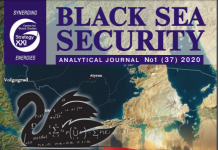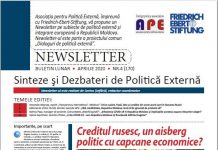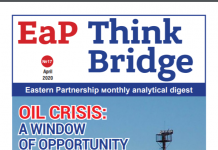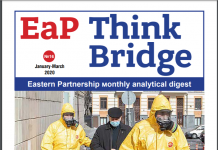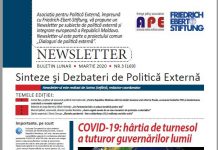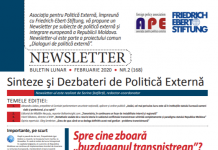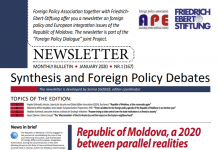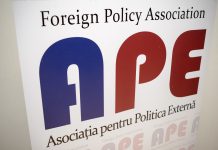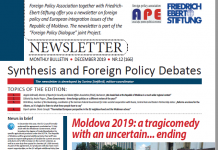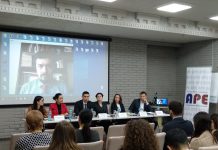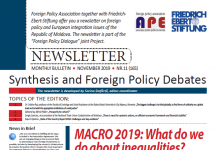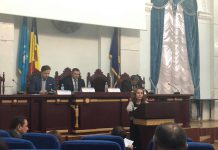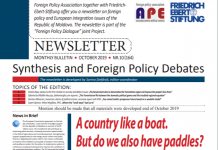ape.md ape.md
Black Sea Security Analytical Journal, no. 1 (37) 2020. Security Issues of the Republic...
Focus on: Russian Hybression in the Black Sea
Natalia Stercul, APE Program Director "SECURITY ISSUES OF THE REPUBLIC
OF MOLDOVA IN THE CONTEXT OF MILITARIZATION OF...
Newsleter, April 2020
TOPICS OF THE EDITION:
1. Veaceslav Negruța, expert at Transparency International - Moldova: “Every word, phrase, idea and condition of this agreement is in favour...
OIL CRISIS: A WINDOW OF OPPORTUNITY FOR THE EASTERN PARTNERSHIP
Analytica: Oil Crisis: a Window of Opportunity for the Eastern Partnership
Moldova imports petroleum products thus satisfying its own need. Therefore, lower global prices should...
EASTERN EUROPEAN #FUTURES. Scenarios for the Eastern Partnership 2030
"As the Eastern Partnership has entered its second decade, challenging questions
remain and arise as to the future of Eastern Europe. For this reason,...
Eastern Partnership vs. Coronavirus: test for democracy
Analytica: Eastern Partnership vs. Coronavirus: test for democracy
Moldova: elections in the times of pandemic
After declaring “red code” coronavirus alert special measures and restrictions were...
Newsletter, March 2020
TOPICS OF THE EDITION:
1. Cornel Ban, associate professor of international political economy: “I see three solutions for the Republic of Moldova: launching a tax...
Laura Zghibarta: The Fourth Estate in the Making: Regulation and Reform of Media in...
In recent years, Moldova’s media sector has been defined by a range of negative characteristics, including monopolization of the media market by those in...
Natalia Stercul: The Republic of Moldova in the context of the 2030 Eastern Partnership...
The Eastern Partnership as a regional dimension of the Eastern Neighborhood is one of the most successful initiatives that have brought positive dynamic transformations...
Newsletter, February 2020
TOPICS OF EDITION:
1. Alexandru Jizdan, Chairman of the Parliamentary Committee for National Security, Defense and Public Order, Secretary General of the Democratic Party of...
Attending the first Global Women’s Forum for Peace and Humanitarian Actions
70 women lead-activists, opinion leaders, representatives of civil society convened in Vienna, Austria, in February 19-20, 2020, within the first Global Women's Forum for...
Newsletter, January 2020
Topics of edition: Angela Grămadă, director, Experts for Security and Global Affairs Association (ESGA), Bucharest: “Republic of Moldova, at the crossroads again” Editorial by...
Victoria Roșa: Freedom of Expression and the Geopolitical Stalemate: Defending Digital Spaces in the...
Victoria Roșa, APE Senior Expert: In response to greater geopolitical threats in the Eurasia region, including hybrid
warfare, Moldova introduced the concept of information security...
APE Activity Report, January – December 2019
APE Activity Report, January - December 2019
Annex 1, APE Activity Report, January - December 2019
Newsletter December 2019
Topics of edition:
1. Angela Grămadă, director of Experts for Security and Global Affairs Association (ESGA), Bucharest: „We should look at the Republic of Moldova...
A policy brief on the foreign policy evolution of the Republic of Moldova during...
The study "A policy brief on the foreign policy evolution of the Republic of Moldova during the period of 2009-2019" was elaborated within the...
The evolution of the foreign policy of the Republic of Moldova analyzed by five...
On December 3rd, took place the public launching of the study entitled "A policy brief on the foreign policy evolution of the Republic of...
Scenario building of the Eastern Partnership 2030
The future of the Eastern Partnership (EaP), after 10 years of existence, is a top subject not only on the political agenda of the...
Newsletter November 2019
Topics of edition:
1.Dr. Cristina Raț, professor at the Faculty of Sociology and Social Assistance at the Babeș-Bolyai University in Cluj-Napoca, Romania: „The biggest challenge...
The relationships between the Republic of Moldova and Ukraine – discussed within a international...
On November 21, in Chisinau, the international scientific conference "Ukraine and the Republic of Moldova: realities, perspectives and challenges" was held in the Academy...
Newsletter, November 2019
TOPICS OF THE EDITION:
1.Victoria Roșa, advisor to the Prim-minister on security and defence issues: „The Government aims to democratize the Transnistrian region and improve...


